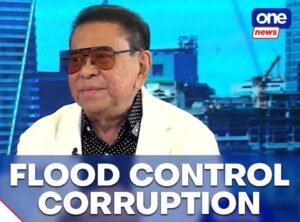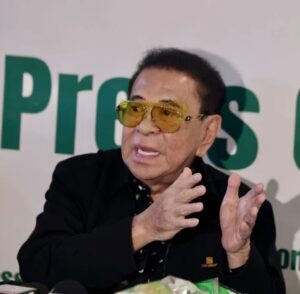Explosive Allegations Rock the Palace: Flood Control Funds Tapped for Personal Gain

In an unprecedented and scathing public address on Monday, Luis “Chavit” Singson, the influential businessman and former Governor of Ilocos Sur, launched a massive political offensive against the administration of President Ferdinand Marcos Jr. Singson accused the sitting president of being the architect and mastermind behind what he dramatically labeled as “the biggest corruption scheme” in the nation’s history. The core of his allegations centers on the misappropriation of billions of pesos allocated for critical flood control projects, which he claims have been systematically siphoned off through a sophisticated and “well-orchestrated network” operating deep within the government apparatus.
The severity of Singson’s claims is underscored by the sheer magnitude of the funds involved. He alleged that a staggering half a trillion pesos ($8.5 billion USD, approximately) earmarked for national flood control initiatives under the current Marcos administration has been wasted. Far from mitigating the seasonal deluge that plagues the archipelago, Singson argued that the situation has demonstrably “worsened” across the country, attributing this failure directly to the absence of a genuine, holistic master plan and the endemic, unbridled corruption that has characterized project implementation.
“This flood control scandal surpasses any corruption I have ever witnessed in my entire life,” Singson stated, speaking with the weight of decades of political experience. He continued, “Having been a close observer of eight presidents who led this nation, I can say with certainty: this is not a mistake. This is an obvious, well-orchestrated scheme created by this administration to systematically exploit the country’s national budget for profound personal and political gain.”
The Paradox of Progress: Thousands of Projects, Zero Relief
Singson’s address drew a sharp contrast between the official statistics of infrastructure development and the bleak reality on the ground. He pointed out that government records show the purported completion of more than 9,800 flood control projects nationwide. Yet, despite this massive investment and volume of work, recurrent and severe flooding continues to ravage agricultural lands, obliterate vital community infrastructure, and tragically displace countless families.
The former governor dissected the government’s operational structure to lay the responsibility squarely at the highest level. He emphasized the inviolable process of public finance: all significant decisions related to infrastructure spending—from the initial drafting of the National Expenditure Program (NEP) to the final signing of the General Appropriations Act (GAA)—are ultimately subject to the President’s direct approval.
“Public funds are not released on a whim; the process is highly controlled,” he asserted. “Every major flood abatement project, every large-scale rehabilitation program, every significant public work—every peso of it passes through his desk. The President personally reviews every plan and provides the final sign-off for the expenditure of every single peso. To claim ignorance or to shift blame is therefore indefensible.”
Targeting the Administration’s Shield and the Home Province Nexus
Singson did not stop at general accusations; he also specifically targeted the official bodies ostensibly tasked with oversight. He took pointed aim at the Independent Commission for Infrastructure (ICI), a body recently tasked with probing alleged anomalies in public works spending. Singson’s critique centered on the ICI’s glaring exclusion of Ilocos Norte—President Marcos Jr.’s own home province—from its ongoing investigation.
He presented compelling evidence of what he described as a protected nexus of corruption in the province. Singson claimed that billions of pesos worth of highly lucrative flood control contracts in Ilocos Norte were channeled and awarded to firms directly linked to the President’s key political allies. Specifically, he named a newly elected mayor in Laoag City and contractors identified as the Discayas as major beneficiaries.
“Almost P4 billion has been funneled to this specific mayor, who appears to be their favorite contractor, since the start of the Bongbong administration,” Singson detailed. He then posed a direct challenge to the accountability body: “Why, given this clear pattern, is the ICI deliberately avoiding an investigation in Ilocos Norte? It is the clearest, most demonstrable example of how corruption is allowed to hide and flourish under the explicit umbrella of political protection.”
Singson subsequently issued a direct public challenge to the President: order the ICI to immediately initiate its probe in Ilocos Norte “to prove its impartiality and credibility to the Filipino people.” He coupled this with a fervent call to action, urging the nation’s youth, religious organizations, and private citizens to unify in their efforts to expose the truth and demand transparency.
Dismissing Retaliation and Issuing an Ultimatum

Anticipating counter-attacks from the administration, Singson preemptively addressed the recent filing of a plunder case against him. He dismissed the charges as a purely “political weapon” engineered with the sole intent of intimidating and silencing him. He characterized the complaint as “a fake document” lodged by a lawyer allegedly connected to his long-standing political rivals in Ilocos Sur.
“They attack me because I am one of the few who is not afraid to speak the unvarnished truth,” Singson declared defiantly. “Let all their paid online troll farms and their political attack dogs come. They will never succeed in silencing me or my commitment to accountability.”
The former governor concluded his fiery address with a profound ultimatum to the head of state. He called upon all segments of Filipino society—from farmers and students to dedicated public servants—to rise up and demand comprehensive accountability from the highest echelons of government. He maintained that the President must either take full, unreserved responsibility for the alleged failures and systemic corruption or, alternatively, “step aside for the sake of the nation.”
“If the President demonstrates that he cannot face the gravity of this truth and take responsibility for his administration’s failures, then he must step aside immediately,” Singson stated. He framed resignation not as an act of defeat, but as a path to national healing: “A voluntary resignation would not be a humiliation; it would be a singular act of dignity that could still potentially restore the shattered trust in our institutions.”
Finally, Singson issued a powerful appeal to the nation’s uniformed services, specifically the Philippine National Police and the Armed Forces of the Philippines (AFP). He implored them to “stand with the people, not with the powerful,” reminding them of their solemn constitutional duty to protect and serve the integrity of the Republic above the interests of any single individual leader.





